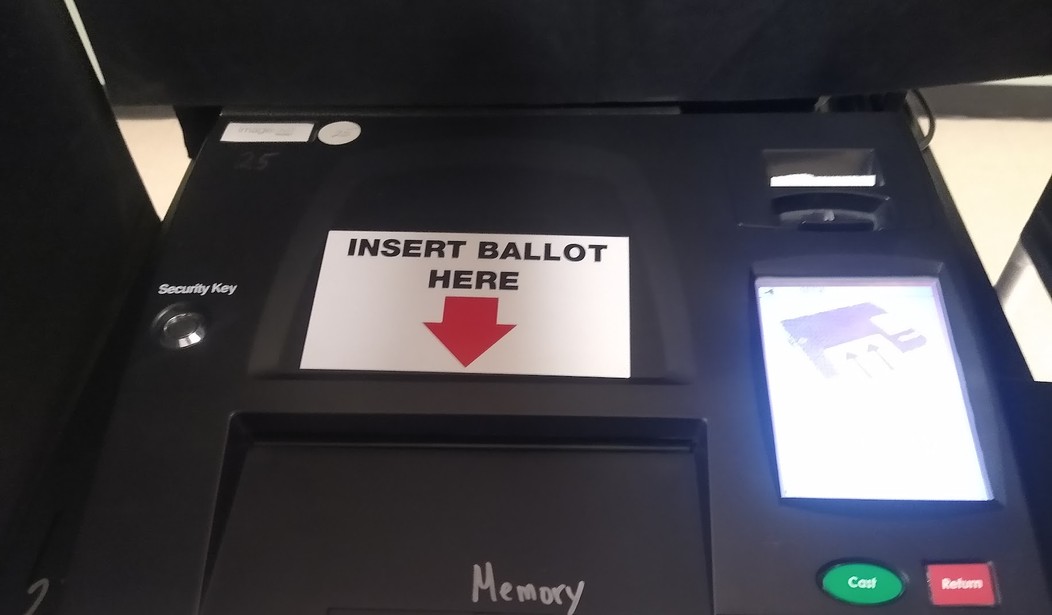Some curious developments came out of the state supreme court in Kansas this week when it ruled on a package of challenges to several new voting laws passed by the legislature recently. One made it a crime "to give the appearance of being an election official." Another placed limits on how many mail-in ballots an individual can collect and turn in. A third required that signatures on ballots be checked against the signature on the voter's registration form. All were put in place to reduce the possibility of voter fraud associated with mass mail-in voting. But it was the ballot signature initiative that generated many legal challenges and lawsuits. The justices probably raised many eyebrows with that ruling when a majority found that there is no inherent right to vote in the Kansas state constitution. (Associated Press)
The Kansas Supreme Court offered a mixed bag in a ruling Friday that combined several challenges to a 2021 election law, siding with state officials on one provision, reviving challenges to others and offering the possibility that at least one will be halted before this year’s general election.
But it was the ballot signature verification measure’s majority opinion — which stated there is no right to vote enshrined in the Kansas Constitution’s Bill of Rights — that drew fiery dissent from three of the court’s seven justices.
The measure requires election officials to match the signatures on advance mail ballots to a person’s voter registration record. The state Supreme Court reversed a lower court’s dismissal of that lawsuit, but the majority rejected arguments from voting rights groups that the measure violates state constitutional voting rights.
A lower court had dismissed a lawsuit challenging the ballot signature initiative, but the state supreme court revived it without striking down the law. The lawsuit claims that mandating a check of the signature somehow invalidates the voter's fundamental right to vote. But the justices found no such right in the state constitution. That's curious because I'd always assumed that all eligible citizens in every state were assumed to have the right to vote. Perhaps that's not the case in Kansas.
These laws were initially vetoed by Democratic Governor Laura Kelly before being overridden by the legislature. Kansas is attempting to lead by example in advance of the November elections. Several of these measure seem quite sensible, even if they could never be passed in blue states (where they are needed the most). Checking ballot signatures against the signatures on voter registration forms makes sense because of the signatures don't match, that's a sign that something is amiss and the ballot should be pulled and held for further inspection. Why anyone, including Democrats would have an issue with that is a mystery unless they're actively trying to encourage voter fraud.
The same goes for limiting the number of ballots that one person can collect and deliver. Personally, the number ten still seems too high by nine to me, but it's better than seeing people showing up at drop boxes with huge bags of ballots and dumping them in under the cover of darkness, as was caught on video in Bridgeport, Connecticut.
The one law I'm not quite so sure about is the one outlawing impersonating an election official. First of all, I would have assumed that it was already illegal to impersonate any government official. This rule appeared to be targeting groups such as the League of Women Voters that answer questions and assist people with registering. The League was among the plaintiffs suing to have the law overturned. That seems like a fairly harmless activity in most cases, but the law didn't provide a requirement to prove that the person was intentionally trying to deceive the voter into believing they were an election official. That shortcoming was what led the state supreme court to strike it down.
This episode should serve as yet another reminder that we need to be particularly vigilant this November. There probably is no legislative solution available to all of the issues that have been created by mass mail-in voting. The GOP needs to have election monitors working at every precinct, at least in the swing states. The names on ballots need to be checked against obituary listings and records of who already submitted a mail-in ballot. We've seen too much hanky panky already to simply ignore the situation. Those complaining about such safeguards are probably the same people who are desperately hoping they won't be caught.








Join the conversation as a VIP Member